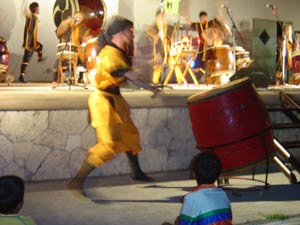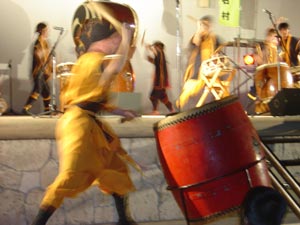Before you read this, please take a deep breath. Maybe make yourself a cup of coffee or something. I have written far more here than I have any right to expect anyone to read…
When I first arrived here, I was shocked at the bureaucracy. Of course, a new arrival in a foreign country probably gets a particularly big exposure to that country’s bureacracy, but what really shocked me was the realisation that a country that in my mind was the most futuristic, technologically advanced place on the planet in fact relies for the most part on paper stamped in triplicate and the postal system in situations where almost all developed countries (and frankly, probably a fair number of developing countries, too) would have a computer system in place, and that it seems to flag behind Britain (and probably most of Europe) in pretty much all non-gadgety implementations of technology. If you want phones with built-in 1.3 megapixel video cameras and megabytes of memory, Japan is the place to come. Just don’t expect cash machines that are open outside office hours, is all (they’re mostly manned, apparently…) Liquid crystal tvs in cars? Yes, but don’t expect to buy one with a credit card: Japan is cash only, in all but large hotels and department stores. The prevalence of the office, and of the shuffling and stamping of forms, came as a surprise and a puzzle to me. Recently, though, I discovered something about Japan’s bureaucracy – something which has led me to see a lot of the things around me in a new light.
At the beginning of April, there was a big staff change in the board of education. I didn’t think much about it at the time – lots of teachers change schools at that time, too, because it’s the beginning of the academic year (like I said before, none of the teachers stay on my island for longer than three years). But over the last couple of weeks, I began to notice that other places seemed to have had a change of staff, too. I didn’t put two and two together until T-sensei, the maths teacher, said yesterday that school dinners have got better this year, now that S-san is running the school dinner center. And then it clicked: everyone has changed jobs. Almost without exception, everyone on the island with a public-service job – the village office, the board of education, the school dinner center, and so on – has swapped jobs with someone else, in a different office. Dozens of people, changing jobs after one year.
At the time, that just seemed surprising, but I thought “fair enough – I suppose it’s a way of limiting the damage that anyone who’s really bad at their job can do, by shuffling them somewhere else after a year.” I could see how that could work. But I kept coming back to it, puzzling about it, and I realised that it also means a number of other things. It puts very tight limits on the extent to which anyone can learn from their mistakes, or get useful experience at anything other than shuffling paper. It also means that for the most part roles that could be filled by someone with some level of experience in the field in question (education, say, or environmental management) are presumably filled by people who can really only bring to it general-purpose experience of office work. Suddenly, the huge amount of paperwork and bureaucracy that I’ve been seeing everywhere began to make sense, and I began to think again about some of the things that have struck me or bothered me since coming here.
My island is a place in decline. The population is less than half what it was thirty years or so ago, and if you spend an afternoon walking around, you see the signs all over the place: coastal footpaths and paths through the hills that are now overgrown and impassable in places; picnic areas whose toilets are out of order and which are clearly rarely tended, let alone used. At first, this all just seemed sad – a sign of the changing times, an unfortunate consequence of Japan’s (or for that matter, any country’s) technological and commercial development presumably having been that people leave relatively poor rural areas for the big city, and don’t come back.
But recently, I began to wonder to what extent it is a sign of this. I began to notice that all over the place there are signs of staggering mismanagement. Picnic areas stand virtually unused on the hills, but meanwhile they appear to be constructing new ones along the coast. With car parks. On the north coast of the island, there is a viewing tower shaped like a monstrous voodoo face. It’s about five-stories tall, and it’s made of sculpted concrete that looks like fibreglass. The effect is like something that’s been lifted out of a third-rate would-be Disneyland, and the main appeal of climbing to the top is that that is the one place in the vicinity where your view of the next island isn’t obstructed by a grotesque voodoo tower. Around the tower’s base are an adventure playground – again, overgrown with creepers, although it’s probably only a few years old – and a car park, in which I have never seen a single car parked.
The whole thing makes me think of the cargo cults that arose on some islands in the South Seas. The islanders, realising that the source of all the Europeans’ cargo (and therefore wealth and power) were aeroplanes, set about constructing full-size runways in the forest, so that the planes could deliver their cargo to them, too. This island also seems to have been developed with an ‘if you build it, they will come’ philosophy in mind: What do tourist attractions have? Picnic areas, car parks, giant concrete faces. Therefore, if you build these things, you will have a tourist attraction. And so a beautiful, semi-tropical island is concreted over at a cost the local council can’t afford (the village office is widely rumoured to be in very serious debt), in an effort to make it a tourist attraction.
The coral reef that surrounds the island is dying, too. At first, I assumed that this was due to climate change, since coral reefs are now calcifying and dying at a fairly rapid rate all over the world. But a couple of months ago, I learnt that the neighbouring island, which is larger but less populated, has an intact reef, less than two kilometres away. No-one knows why the reef on this island is dying, but I’ve heard a number of people blame it on the huge amount of construction work (and consequently deforestation and stirring up of sediment) on and around the island.
But if the people in charge of development here are only in their job for one year before being shuffled to some other department, if the only useful experience they bring to the job is whatever office skills they have, is it any wonder that things are as they are? The philosophy behind this annual job-shuffling would seem to be that managing children’s education, managing commercial and agricultural development, and managing the environment are all essentially just managing something. Unfortunately, the extent to which educational management is anything like environmental management seems to be indicated by the dying coral reef, the acres of empty car-parks, and a monstrous concrete face.
Of course, I live on a small island in a rather atypical corner of Japan, and so I can’t really generalise to the whole of Japan. Next, I have to find out how widespread the practice of everyone swapping jobs is. If it’s peculiar to my island it wouldn’t go far as an explanation of Japan’s bureacracy, but I know that a certain amount of job-swapping happened in the (local government) office where Kim works at the same time… I strongly suspect this is a Japan-wide thing.
It’s a sad fact that one of my reasons for wanting to scuba-dive is to experience a beautiful thing while it still has some glory left in it. The things I’ve seen lately have made me begin to fear that learning Japanese might turn out to be a similar exercise. I hope it doesn’t, because I want to hold on to my belief that the world has things to learn from Japan, but the more I see of Japan, the more pessimistic I become about it.



